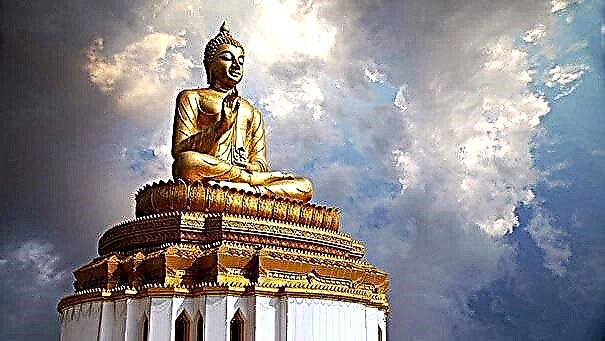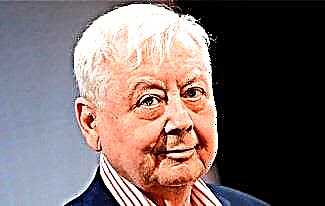Friedrich Wilhelm Nietzsche (1844-1900) - German thinker, classical philologist, composer, poet, creator of a distinctive philosophical doctrine, which is emphatically non-academic and spread far beyond the scientific and philosophical community.

The fundamental concept includes special criteria for assessing reality, which cast doubt on the fundamental principles of the existing forms of morality, religion, culture and socio-political relations. Written in an aphoristic manner, Nietzsche's works are perceived ambiguously, causing a lot of debate.
There are many interesting facts in the biography of Nietzsche, which we will talk about in this article.
So, before you is a short biography of Friedrich Nietzsche.
Biography of Nietzsche
Friedrich Nietzsche was born on October 15, 1844 in the German village of Recken. He grew up and was brought up in the family of the Lutheran pastor Karl Ludwig. He had a sister, Elizabeth, and a brother, Ludwig Joseph, who died in early childhood.
Childhood and youth
The first tragedy in the biography of Friedrich occurred at the age of 5 after his father died. As a result, the upbringing and care of children fell entirely on the shoulders of the mother.
When Nietzsche was 14 years old, he began his studies at the gymnasium, where he studied ancient literature with great interest, and was also fond of music and philosophy. At that age, he first tried to take up writing.

Four years later, Friedrich successfully passed the exams at the University of Bonn, choosing philology and theology. Student everyday life quickly bored him, and his relations with fellow students were extremely bad. For this reason, he decided to transfer to the University of Leipzig, which today is the second oldest university in the territory of modern Germany.
However, even here, the study of philology did not cause much joy in Nietzsche. At the same time, he was so successful in this field of science that when he was only 24 years old, he was offered the position of professor of philology at the University of Basel (Switzerland).
This was an unprecedented event in the history of European universities. However, Frederick himself did not take much pleasure in teaching, although he did not abandon his professorial career.
After working for some time as a teacher, Nietzsche decided to publicly renounce his Prussian citizenship. This led to the fact that later he could not participate in the Franco-Prussian War, which broke out in 1870. Since Switzerland did not occupy any of the warring parties, the government forbade the philosopher to participate in the war.
However, the Swiss authorities allowed Friedrich Nietzsche to go into service as a medical orderly. This led to the fact that when the guy was traveling in a carriage with wounded soldiers, he contracted dysentery and diphtheria.
By the way, Nietzsche was a sickly child from childhood. He often suffered from insomnia and headaches, and by the age of 30 he was almost completely blind. He completed his work in Basel in 1879, retiring and taking up writing.
Philosophy
The first work of Friedrich Nietzsche was published in 1872 and was called "The Birth of Tragedy from the Spirit of Music." In it, the author expressed his opinion on the dualistic (concepts of which are inherent in 2 opposite principles) origins of art.
After that he published several more works, among which the most famous was the philosophical novel Thus Spoke Zarathustra. In this work, the philosopher detailed his main ideas.

The book criticized Christianity and preached anti-theism - the rejection of faith in any deity. He also presented the idea of a superman, which meant a certain creature superior in power to modern man as much as the latter surpassed the monkey.
To create this fundamental work, Nietzsche was inspired by a trip to Rome in the late 19th century, where he became closely acquainted with the writer and philosopher Lou Salome.
Friedrich found a kindred spirit in a woman, with whom he was not only interested in being, but also to discuss new philosophical concepts. He even offered her a hand and a heart, but Lou invited him to remain friends.
Elizabeth, Nietzsche's sister, was dissatisfied with the influence of Salome on her brother and decided at all costs to quarrel her friends. She wrote an angry letter to the woman, which provoked a quarrel between Lou and Frederick. Since then, they never spoke again.
It is worth noting that in the first of 4 parts of the work "Thus Spoke Zarathustra", the influence of Salome Lou on the thinker was traced, along with their "ideal friendship." An interesting fact is that the fourth part of the book was published in 1885 in an amount of only 40 copies, some of which Nietzsche donated to friends.
One of Friedrich's last works is The Will to Power. It describes what Nietzsche saw as a key driving force in people - the desire to achieve the highest possible position in life.
The thinker was one of the first to question the unity of the subject, the causality of the will, the truth as a single foundation of the world, and the possibility of rational justification of actions.
Personal life
The biographers of Friedrich Nietzsche still cannot agree on how he treated women. A philosopher once said the following: "Women are the source of all stupidity and folly in the world."
However, since during his life Frederick repeatedly changed his views, he managed to be a misogynist, a feminist, and an antifeminist. At the same time, the only woman he loved was, obviously, Lou Salome. Whether he felt feelings for other individuals of the fairer sex is unknown.

For a long time, the man was attached to his sister, who helped him in his work and took care of him in every possible way. Over time, the relationship between sister and brother deteriorated.
Elizabeth married Bernard Foerster, who was an ardent supporter of anti-Semitism. The girl also despised Jews, which angered Frederick. Their relationship improved only in the last years of the life of a philosopher who needed help.
As a result, Elizabeth began to dispose of her brother's literary heritage, making many amendments to his works. This led to the fact that some of the views of the thinker have undergone changes.
In 1930, the woman turned out to be a supporter of Nazi ideology and invited Hitler to become an honorary guest of the Nietzsche museum-archive, which she herself founded. The Fuhrer actually visited the museum several times and even ordered Elizabeth to be given a life pension.
Death
The man's creative activity ended about a year before his death, due to a clouding of mind. It happened after a seizure caused by beating a horse right in front of his eyes.
According to one version, Frederick experienced a great shock while watching the beating of an animal, which caused a progressive mental illness. He was admitted to a Swiss mental hospital, where he remained until 1890.
Later, the elderly mother took her son home. After her death, he received 2 apoplectic strokes, from which he could no longer recover. Friedrich Nietzsche died on August 25, 1900 at the age of 55.
Nietzsche Photos
















